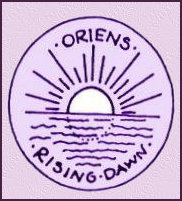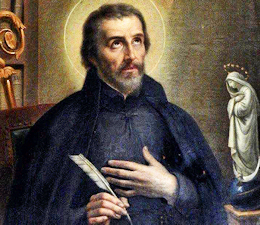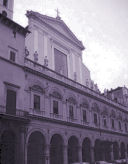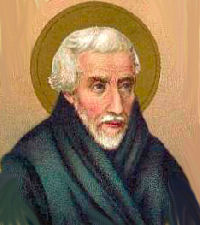Advent: December 21st
December 21, O Oriens (O Dayspring); Optional Memorial of St. Peter Canisius, Priest and Doctor
Other Titles: Day 5 O Antiphons: O Oriens (O Dayspring)
» Enjoy our Liturgical Seasons series of e-books!
Today the Church celebrates the Optional Memorial of St. Peter Canisius (1521-1597), who was born at Nijmegen, Holland, at the very time that Luther began to rebel against the Church and St. Ignatius Loyola was laying the foundations of the Jesuit Order. After studying the arts, civil law and theology, St. Peter joined the Jesuit Order and was ordained a priest in 1546. He is noted especially for the following services to the Church: he defended the Catholic faith against the Protestants; by preaching, writing, founding colleges and seminaries, he caused Catholic life to flourish; he rendered invaluable services to the ecumenical Council of Trent; he wrote many catechisms which were translated into twelve languages in his own life time. He died in Fribourg, Switzerland.
According to the previous missal (1962), today was the feast of St. Thomas the Apostle, now celebrated July 3. There are many traditions related to St. Thomas (A-Thomasing and Christmas baking) that were practicing on December 21st that are connected with preparing for Christmas, since his feast originally was a few days before Christmas. The traditions still hold merit, but are no longer attached to his feast day.
Today is the Fifth of the O Antiphons, O Oriens (O Radiant Dawn/O Dayspring/O Morning Star). It is the Sun, the Redeemer, whom we await. "I am the light [the sun] of the world" (John 8:12). Christ is the light of the world because of the faith which He has infused into souls. He has enlightened the world by His teaching and by the example of His life. In the crib, in Nazareth, on the cross on Calvary, in the tabernacle of our churches, He answers the eternal questioning of the benighted soul.
![]()
For those following the Jesse Tree, you can either continue through Christmas Eve following Catholic Culture's Jesse Tree, or use symbols based on the “O” Antiphons (see Jesse Tree Instructions).
Jesse Tree, Day 25 ~ Elizabeth
Jesse Tree Overview
O Radiant Dawn
O eternal Sun, come and enlighten us, for where Thou art not, there is darkness, death, and wickedness. "Come and enlighten all who sit in darkness and in the shadow of death."
"But now [you are] light in the Lord" (Eph. 5:18). In the Church the light has now appeared to us on the first Christmas night, on the day of our baptism, daily in the Mass and at the time of Holy Communion, and in the many inspirations and promptings of grace. How thankful we should be for this light, which is Christ.
But we have yet to reach the full measure of the stature of Christ. Alas! we let ourselves be burdened by earthly sorrow, we are distracted by the excitement of the moment, and our spiritual growth is hampered by our attachment to the things of this world. Fervently we should repeat that plea of Holy Mother the Church. "O dawning Sun of righteousness, come and enlighten us, who yet sit in the darkness of suffering, of human reasoning, and of self-love."
The light of Christ will be revealed perfectly only when we meet Him at the time of His second coming. Then we shall be brought into the light of glory, and we shall "shine as the sun in the kingdom of the Father" (Matt. 13:48). "Sown in corruption we shall rise in incorruption" (I Cor. 15:42). May the day of enlightenment come soon!
—Excerpted from The Light of the World by Benedict Baur, O.S.B.
![]()
 Fifth O Antiphon: O Oriens (O Dayspring)
Fifth O Antiphon: O Oriens (O Dayspring)
Symbols: Sun with Rays
Come, and shine on those seated in darkness, and in the shadow of death.
Traditional Antiphon: O Dawn, splendor of eternal light, and sun of justice, come, and shine on those seated in darkness, and in the shadow of death.
O Oriens, splendor lucis aeternae, et sol justitiae: veni, et illumina sedentes in tenebris, et umbra mortis.
Vespers Antiphon: O Radiant Dawn, splendor of eternal light, sun of justice: come, shine on those who dwell in darkness and the shadow of death.
Just as the natural sun gives light and life to all upon whom its rays fall, so Christ, the Rising Dawn, dispels darkness and brings eternal life and light.
Recommended Reading: Malachi 4:2-6
St. Peter Canisius
 Peter Canisius, the remarkable Jesuit who almost single-handedly reevangelized Central Europe, founded dozens of colleges, contributed to the rebirth of Catholicism by his prodigious writings, and laid the groundwork for the Catholic Reformation north of the Alps. He was born at Nijmegen, Holland, in 1521, and his father was an instructor to princes in the court of the duke of Lorraine. St. Peter Canisius was part of a movement for religious reform as a very young man and in 1543, after attending a retreat given by Blessed Peter Favre, joined the Jesuits and was the eighth professed member of the Society of Jesus.
Peter Canisius, the remarkable Jesuit who almost single-handedly reevangelized Central Europe, founded dozens of colleges, contributed to the rebirth of Catholicism by his prodigious writings, and laid the groundwork for the Catholic Reformation north of the Alps. He was born at Nijmegen, Holland, in 1521, and his father was an instructor to princes in the court of the duke of Lorraine. St. Peter Canisius was part of a movement for religious reform as a very young man and in 1543, after attending a retreat given by Blessed Peter Favre, joined the Jesuits and was the eighth professed member of the Society of Jesus.
He worked first in the city of Cologne, becoming a spokesman for the Catholic party. He became a consultor to the cardinal of Augsburg at the Council of Trent and in 1547 was called by St. Ignatius to Rome. He was sent to Sicily to teach, then, after his solemn profession in Rome, was sent back to Germany as the first superior of the German province of the Jesuits.
Peter next began to restore and found colleges, first in Vienna and Prague, and then in Munich, Innsbruck, and throughout northern Germany. He attracted vocations to the Jesuits, and the society began to flourish in Central Europe. He organized the Jesuits into a compact unit and made the society a leading force in the Counter-Reformation. He was in contact with all the Catholic leaders in Germany, and wrote fourteen hundred letters giving support to those laboring for reform. He was the adviser of the emperor and the confidante of three popes. He was consulted by papal legates and nunciatures and was a severe critic of religious and clerical life in post-Reformation Germany.
He recommended far-reaching reforms and had a profound effect upon the education and spiritual life of the clergy. Through his efforts, seminaries were founded, and the popes sent him on important diplomatic missions. In the midst of his many labors, he edited and published editions of the Fathers of the Church, catechisms, spiritual manuals, and textbooks that went into countless editions even in his own lifetime.
He died on December 21, 1597, at Fribourg, Switzerland, and was canonized and declared a Doctor of the Church in 1925.
Patronage: Germany; Catholic press; catechism writers
Symbols and Representation: with his catechism and other books; teaching a group of children
Highlights and Things to Do:
- Celebrating the Feast of St. Peter Canisius
- Read more about St. Peter Canisius:
- Read the text from the General Audience of Pope Benedict XVI, February 9, 2011
- His relics are in Fribourg, Switzerland.
- Celebrating the Feast of St. Thomas the Apostle (in the previous 1962 missal)
Today is Day Six of the Christmas Novena.

Ember Saturday of Advent
Station with Santi Dodici Apostoli (the Twelve Holy Apostles, also Santi Apostoli):
The stational church for today's Mass is the church of the Twelve Apostles in Rome. Mary is the apostle of the liturgy, the Mediatrix of all grace. She is the root from which springs the full bloom, Christ. "And of His fullness we all have received, and grace for grace" (John 1:16). It was erected by Julius I (337-352) over the barracks of ancient Rome's firemen and entrusted since 1463 to the Conventual Franciscans. Originally dedicated to the Apostles St. James and St. Philip, it was rededicated to all the Apostles in the 16th century. It is currently in the care of Conventual Franciscans.
For more on Santi Dodici Apostoli, see:
For further information on the Station Churches, see The Stational Church.






